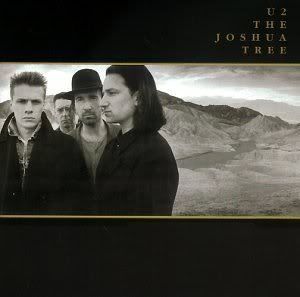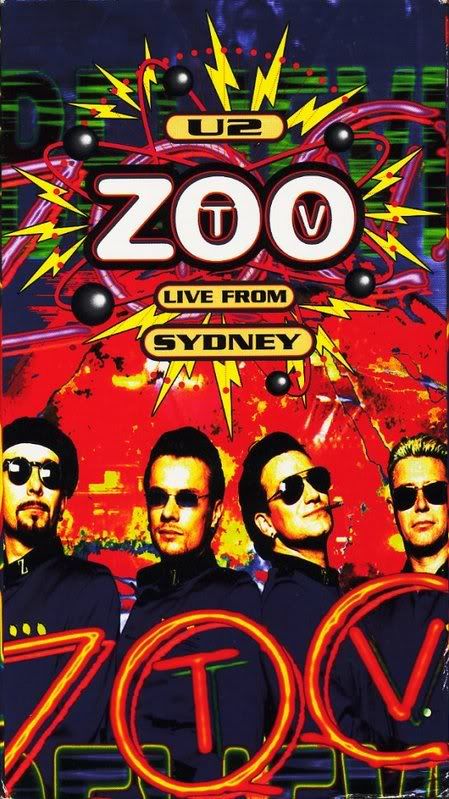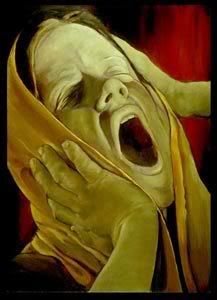 Has there ever been a better three song combo to kick off an album? Led Zeppelin IV certainly rivals The Joshua Tree in such a venture and I’m sure one of the band’s advocates could make a strong case, but I’ll stick to my guns and nominate U2’s Grammy-winning offering.
Has there ever been a better three song combo to kick off an album? Led Zeppelin IV certainly rivals The Joshua Tree in such a venture and I’m sure one of the band’s advocates could make a strong case, but I’ll stick to my guns and nominate U2’s Grammy-winning offering.
The Joshua Tree is held in the highest esteem by most U2 fans and for me only Achtung Baby reaches loftier heights. I was 10 years old when U2 released The Joshua Tree, and it remains an integral part of my childhood. U2 were cool even though they weren’t trying to be. In fact, take a look at the videos from the album’s singles and try to picture them in the same vein as Bon Jovi, Motley Crue and Poison at the height of their hair band successes – the barometer of what was “cool” at the time. It’s practically impossible to do, because U2 always marched to the beat of Larry Mullen’s drum. In fact, the videos would probably fit in to the current video landscape without raising an eyebrow.
The album pierced through all the make up and hair of the 80’s to become one of the best-selling albums of the decade. Song-by-song I will take you into The Joshua Tree, beginning of course with the three aforementioned gems, timeless pieces that will be remembered fondly even after U2 decide they’re through with conquering the musical spectrum.
Where the Streets Have No Name
It comes at you as if you’ve awakened at dawn, rays of sunshine racing towards you across the horizon, a fresh slate empowering you to tackle the day however you see fit. These are the images ingrained into my head when I hear the dreamy opening to Where the Streets Have No Name (and this before a single guitar chord is struck).
When The Edge gradually strolls in with that unforgettable delay riff, your spirits are lifted and your batteries are immediately recharged. Many interpretations can be spun from the song’s lyrics, but for me it’s always been a song of hope and a prayer to what can be. At the same time it is also an invitation to your closest love, an invitation to follow you wherever you are going, no matter what:
Where the Streets Have No Name
We’re still building then burning down love
And when I go there, I go there with you…
Some say Bono meant the title as a metaphor for Heaven, but for me it’s an allusion to a destination that hasn’t been plotted.
I Still Haven’t Found What I’m Looking For
A gospel song that took the world by storm upon its release, the subtleness of the ballad was key to its success. Had Bono decided to sing “I’ve yet to find God, but I’ll keep looking”, it wouldn’t have gone over so well. Making it accessible to the masses and allowing it to be interpreted by each individual: therein lies its appeal.
I remember thinking how freakishly long Bono’s finger looked in the video, when he shakes it at the camera. The
With or Without You
 U2 don’t really write love songs. They choose to be honest about the difficulties of love, relaying their experience and digging deep into the issues facing couples. When they do write a song that glorifies love, they seem to always add a caveat. In the case of With or Without You, the message is: “If I’ve won your love, there’s nothing left worth winning. If I lose you, I’ve lost everything.” When Bono utters “With or without you I can’t live”, he’s alluding to that very conundrum where you’ve met someone that should you win, or lose, there is no reason to go on because he/she is everything. Love song indeed.
U2 don’t really write love songs. They choose to be honest about the difficulties of love, relaying their experience and digging deep into the issues facing couples. When they do write a song that glorifies love, they seem to always add a caveat. In the case of With or Without You, the message is: “If I’ve won your love, there’s nothing left worth winning. If I lose you, I’ve lost everything.” When Bono utters “With or without you I can’t live”, he’s alluding to that very conundrum where you’ve met someone that should you win, or lose, there is no reason to go on because he/she is everything. Love song indeed.
Someone may correct me on this, but I believe the Edge’s use of a magnet over his guitar - which produces the wail you hear in this song – was a pioneering move. It was certainly the first time I heard it. That wail is such a mood-setter. Along with Adam Clayton’s fantastic baseline and Larry Mullen’s deceptively difficult drum beat, the song arduously plows through the conflicted thoughts of a man enslaved by his feelings for his lover.
A true-to-life characterization of the problems of blissful love – exactly the kind of insight into the human condition we expect from the biggest band in the world.
Bullet the Blue Sky
This song, recorded almost 20 years ago, has continued to feature in U2’s live show even though it was never released as a single. Its staying power can be credited to the song’s powerful anti-American foreign policy message, which keeps gaining relevance with every illegal American incursion and Empire-building move.
The song is rife with military and religious imagery - from Jacob’s story of redemption to the aching description of bombs striking fear into innocent women and children - this song brings us the story of the victims, the aggressor and their relative detachment from one another.
Again, subtlety is the lyrical key. For example, take this quote from the song’s spoken-word verse:
This guy comes up to me
His face red like a rose on a thorn bush
Like all the colors of a royal flush
And he's peeling off those dollar bills
Slappin' 'em down
One hundred, two hundred
The message? Money is to be made from the deaths of civilians, and Capitalists are bound to line up. American society is detached from the horrors of its foreign policy, absolving itself of blame and convincing itself that people will run into its arms, as the final verse portrays:
Across the field you see the sky ripped open
See the rain through a gaping wound
pounding on the women and children
who run...
Into the arms...of
Perhaps that’s what Bono was alluding to when he brought up Jacob’s story of Redemption (Genesis 31:11). Jacob has performed sinful deeds, but he is made Prince of Israel by God. Jacob wrestled the Angel and the Angel was overcome.
Musically, I am drawn to Adam’s two-note bass line. This is most likely the simplest bass performance of any U2 song, but its simplicity mirrors the plodding determination of the people in these victimized countries to resist being overcome – militarily, if Larry’s drumbeat is any indication.
Running to Stand Still
An understated song, it is the beautiful story of a young girl looking to break free from this terrible addiction. She realizes that her generation is being eaten alive by this plague, and vows to cleanse herself:
And so she woke up
Woke up from where she was
Lying still
Said I gotta do something
About where we're going
The album version, although powerful in itself, does not do justice to the live performance of the song. Do yourself a favor and find a version of U2’s rendition of this song in
Thacherism spread like a plague across the British landscape during the 80’s. There wasn’t a worker’s union or a third world country that couldn’t be brought to its knees in the Iron Maiden’s view. Red Hill Mining Town is a capsule of the despair Thatcher brought to small industrial towns during her reign.
The nationwide strikes tore families and communities apart. Men were forced to make a moral stand at the expense of their families having bread on the table. It lead to many people to cross picket lines and be labeled scabs and traitors.
A very painful period in modern British times, this song is a testament to the hardships regular blue-collar people suffered through in order to fight the government’s corporate pandering.
In God’s Country
“Desert sky, dream beneath the desert sky”
This song is plastered with vivid imagery contrasting
Sad eyes, crooked crosses
In God's country
Trip Through Your Wires
To me, this is the weakest song of the album…which is saying something. A bluesy offering about surrendering yourself to your woman in order for her to lick your wounds. I could be wrong, mind you, since I haven’t spent much time analyzing this one. It has never captured my imagination.
One Tree Hill
This dreamy little tune is loaded with meaning for the band. On the one hand it speaks of corrupt government in
Exit
I really love this song. It is dark and brooding, and rightfully so since Bono inhabits the twisted mind of a serial killer for its duration. I’m a sucker for songs with slow buildups culminating in powerful crescendos, and Exit delivers with aplomb. I especially like when Edge’s guitar erupts into a solo, Larry’s cymbals thundering in the background. Best listened to with the lights out, when dark thoughts haunt you.
Mothers of the Disappeared

Midnight, our sons and daughters
Were cut down and taken from us
Hear their heartbeat
We hear their heartbeat
In the wind, we hear their laughter
In the rain, we see their tears
Hear their heartbeat
We hear their heartbeat
0 comments:
Post a Comment